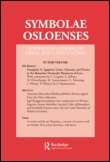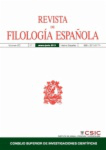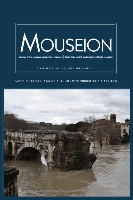
Eikasmos-Quaderni Bolognesi di Filologia Classica
Scope & Guideline
Cultivating Insight in Classical Linguistic Studies
Introduction
Aims and Scopes
- Classical Textual Criticism:
The journal emphasizes rigorous textual criticism of classical works, seeking to refine and restore ancient texts through detailed analysis and emendation. - Interdisciplinary Approaches:
It encourages interdisciplinary studies that bridge philology with linguistics, history, philosophy, and other fields, promoting a comprehensive understanding of classical literature. - Cultural and Historical Contextualization:
The journal focuses on the cultural and historical contexts of classical texts, examining how these works reflect and influence the societies from which they emerged. - Reception Studies:
There is a strong interest in the reception of classical texts throughout history, exploring how ancient works have been interpreted and reinterpreted in various cultural settings. - Comparative Literature:
The journal also engages in comparative studies, examining similarities and interactions between classical texts and other literary traditions, enhancing the understanding of their global impact.
Trending and Emerging
- Interdisciplinary and Cross-Cultural Studies:
There is an increasing trend towards interdisciplinary studies that integrate insights from various fields, such as philosophy, cultural studies, and even modern linguistics, enhancing the richness of classical analysis. - Focus on Gender and Sexuality in Classical Texts:
Emerging themes include a heightened focus on gender and sexuality, particularly in the analysis of texts by authors like Sappho and Aristophanes, reflecting broader societal discussions on these topics. - Digital Humanities and Textual Analysis:
The integration of digital humanities tools for textual analysis and interpretation is becoming more prominent, allowing for innovative approaches to classical texts and their dissemination. - Global Perspectives on Classical Literature:
There is a growing emphasis on exploring classical literature from a global perspective, examining how ancient texts interact with and influence other literary traditions outside of the Western canon. - Thematic Studies on Emotion and Identity:
Recent works increasingly address themes of emotion and identity in classical literature, exploring how these concepts manifest in different texts and genres.
Declining or Waning
- Traditional Philological Methods:
There appears to be a waning interest in purely traditional philological methods, with fewer papers focusing solely on grammatical and syntactical analyses without broader contextualization. - Limited Focus on Lesser-Known Texts:
The journal has seen a reduction in articles dedicated to lesser-known or obscure texts, as scholars increasingly gravitate towards more widely recognized classical works that have broader implications. - Decline in Historical Linguistics:
Research related to historical linguistics and its application to classical texts has diminished, possibly due to a growing preference for thematic and contextual studies over linguistic analysis.
Similar Journals

Materiali e Discussioni per l Analisi dei Testi Classici
Unveiling the Richness of Classical AnalysisMateriali e Discussioni per l'Analisi dei Testi Classici is a distinguished academic journal published by Fabrizio Serra Editore that focuses on the rich field of Classics and Literature, serving as a vital platform for scholarly discourse and research. Featuring ISSN 0392-6338 and E-ISSN 1724-1693, this journal has been actively publishing since 2009, with a dedicated effort to analyze classical texts and foster critical discussions among academics and students alike. Although the journal operates without an open access model, it is recognized for its significant contributions, evidenced by its ranking in the third quartile (Q3) in both the Classics and Literature categories as of 2023. This places it among the notable outlets for literary and classical scholarship, with Scopus ranks highlighting its ongoing influence in these fields. Based in the heart of Italy, in Pisa, the journal not only enriches the academic community but also provides an essential resource for those engaged in the profound study of classical literature, inviting contributions that challenge and expand current knowledge and methodologies.

Eirene-Studia Graeca et Latina
Connecting Past and Present through ResearchEirene-Studia Graeca et Latina, ISSN 0046-1628, is a prominent academic journal published by the Institute of Classical Studies, Academy of Sciences of the Czech Republic. Focusing on the fields of Classics, Linguistics, and Archaeology, this journal serves as a vital platform for scholarly discourse and research dissemination since its inception in 2002. Although it operates under a traditional access model, the journal has established itself within the academic community, evidenced by its placement in the Q4 category across multiple disciplines in 2023. This includes significant rankings in areas such as Archaeology and Language and Linguistics, where it finds itself within the 27th to 16th percentiles of its respective categories. Eirene aims to foster the advancement of research in the Humanities, providing a rigorous forum for scholars and practitioners interested in classical studies. Its contribution to the academic landscape is essential for those who aspire to explore the depths of ancient languages, cultures, and methodologies, making it a valuable resource for researchers, professionals, and students alike.

Symbolae Osloenses
Celebrating a Century of Classical InquirySymbolae Osloenses, published by TAYLOR & FRANCIS LTD, is a distinguished journal in the field of Classics, with a rich history dating back to its inception in 1922. This UK-based journal has continuously contributed to the scholarly discourse surrounding ancient cultures, languages, and literature, making it a crucial resource for researchers, educators, and students alike. Though it operates under a subscription model, its impact on the academic community is underscored by its recent inclusion in the 2023 Scopus rankings, where it holds a respectable position in the 65th percentile among its peers. With decades of published research spanning from 1924 to 2023, Symbolae Osloenses remains committed to fostering robust academic dialogue and advancing knowledge in the Classics, catering to a diverse readership seeking to explore the nuances of classical studies.

MNEMOSYNE
Connecting scholars through innovative insights.MNEMOSYNE is a prestigious academic journal published by BRILL, specializing in the fields of Archeology, Classics, History, Linguistics and Language, and Literature and Literary Theory. With a remarkable history dating back to its inception in 1948, this journal continues to be a crucial resource for scholars and researchers, spanning its publication years that extend to 2024. The journal boasts high rankings in multiple categories according to Scopus, including Q1 status in Classics and History, reflecting its impact and relevance in the academic community. Although it is not an Open Access journal, its selection of peer-reviewed articles ensures rigorous scholarship that contributes to ongoing discussions and discoveries in the humanities. By providing a platform for innovative research and critical discourse, MNEMOSYNE plays an integral role in advancing the understanding of cultural and historical contexts, making it an essential read for both seasoned academics and emerging scholars alike.

Minerva-Revista de Filologia Clasica
Advancing classical scholarship for a global audience.Minerva-Revista de Filologia Clasica, an esteemed academic journal published by the Universidad de Valladolid, is a pivotal resource in the fields of Classics, Linguistics, and Literature. With its ISSN 0213-9634 and E-ISSN 2530-6480, this journal has been championing open access since 2017, making high-quality research accessible to a global audience. Based in Valladolid, Spain, Minerva is dedicated to the exploration and dissemination of scholarly work related to classical philology, offering a platform for the exchange of ideas among researchers, educators, and students alike. Recognized in the 2023 category quartiles as Q3 in Classics and Q4 in Linguistics and Language, this journal provides valuable insights and contributes significantly to its fields, allowing authors and readers to engage with important discussions and innovative perspectives. As the academic landscape evolves, Minerva continues to adapt, fostering a vibrant community committed to the advancement of knowledge in antiquity and its linguistic dimensions.

REVISTA DE FILOLOGIA ESPANOLA
Illuminating the Landscape of Linguistics and LiteratureREVISTA DE FILOLOGIA ESPANOLA is a distinguished academic journal dedicated to the fields of linguistics and literature, published by the CONSEJO SUPERIOR INVESTIGACIONES CIENTIFICAS (CSIC) since 1954, and has been an Open Access journal since its inception. Situated in Madrid, Spain, this journal has emerged as a crucial platform for the dissemination of scholarly research, with notable rankings including Q2 in Linguistics and Language and Q1 in Literature and Literary Theory as of 2023. The journal's commitment to fostering academic dialogue is reflected in its impressive Scopus rankings, including a 79th percentile in the Arts and Humanities for Literature and Literary Theory. Covering a wide range of topics from linguistic theory to literary critique, REVISTA DE FILOLOGIA ESPANOLA is essential reading for researchers, professionals, and students alike, providing valuable insights and cutting-edge research in the ever-evolving landscape of Spanish philology.

Mouseion-Journal of the Classical Association of Canada
Fostering interdisciplinary dialogue in Classics.Mouseion - Journal of the Classical Association of Canada, published by University of Toronto Press Inc, stands as a vital academic resource in the fields of Classics and Archaeology. With a focus on promoting scholarly discourse, this journal provides a platform for original research, critical reviews, and interdisciplinary studies that engage with ancient cultures and their legacies. Since its convergence in 2019, Mouseion has quickly established itself within the academic community, achieving a commendable Q1 ranking in Classics and Q2 in both Archaeology categories in 2023, showcasing its commitment to excellence. While not an open-access journal, it is positioned among the top 29% of classics journals, reflecting its impact and the quality of publications. Nestled within Canada, this journal addresses a global audience of researchers, professionals, and students dedicated to the exploration of the classical world, and it endeavors to contribute significantly to the scholarly understanding of cultural heritage.

QUADERNI URBINATI DI CULTURA CLASSICA
Exploring the Rich Tapestry of Classics and LinguisticsQUADERNI URBINATI DI CULTURA CLASSICA is a distinguished academic journal dedicated to the interdisciplinary exploration of Classics, Linguistics, and Literary Theory. Published by ACCADEMIA EDITORIALE PISA-ROMA, this journal serves as a vital scholarly platform for researchers and professionals alike, facilitating in-depth discussions and analyses that contribute to these evolving fields. With an ISSN of 0033-4987 and an E-ISSN of 1724-1901, it boasts a robust Scopus ranking, placing it within the second quartile in Classics and the third quartile in related disciplines as of 2023. Although it is not an open-access journal, QUADERNI URBINATI DI CULTURA CLASSICA remains essential for those engaged in the study of language, literature, and classical cultures, encouraging scholarly exchange and innovation from its base in Rome, Italy. Researchers and students will find valuable insights and methodologies within its pages, making it a key resource for fostering academic growth and understanding.

Antichthon
Cultivating Knowledge in Classics and BeyondAntichthon, published by Cambridge University Press, stands as a vital platform within the field of Classics. Established in 1986, the journal has evolved to encompass scholarly contributions that explore various dimensions of classical studies, including literature, history, and cultural studies. With its rich publication history extending from 2011 to 2023, Antichthon boasts a commendable Q2 ranking in the latest 2023 Category Quartiles for Classics, reflecting its significant impact in the academic community. Although the journal does not offer an Open Access option, it continues to engage researchers and academics with its curated selection of articles, reviews, and critical insights. Located at the Edinburgh Building, Shaftesbury Rd, Cambridge, England, this journal remains an essential resource for both established scholars and students aiming to deepen their understanding of classical antiquity and its enduring relevance.

Filologia Mediolatina
Cultivating Knowledge in the Realm of Medieval StudiesFilologia Mediolatina is an esteemed academic journal dedicated to the study of Medieval Latin philology, published by SISMEL EDIZIONI GALLUZZO in Italy. With an ISSN of 1124-0008, this journal provides a critical platform for researchers, professionals, and students to explore the intricate relations between language, culture, and textual analysis in the medieval period. Although its impact factor is not specified, Filologia Mediolatina falls within the Q4 category in the Linguistics and Language field as of 2023 and holds a notable rank in the arts and humanities sector, highlighting its niche yet vital role in the academic community. The journal offers insights into linguistic evolution and historical texts, making it a valuable resource for those engaged in these disciplines. It has continued to publish relevant articles from 2015 to 2023, contributing to scholarly discussions and enriching the knowledge base in medieval studies.